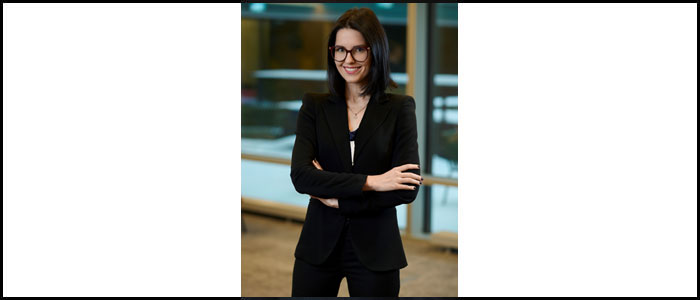
ACAMS Today interviewed Rūta Bajarūnaitė for International Women’s Day 2023. Bajarūnaitė is chief officer of the Sanctions Group for the Ministry of Foreign Affairs of Lithuania. She is responsible for preparing and coordinating proposals for sectoral measures, including individual listing proposals. Bajarūnaitė also provides policy guidance and supports the negotiations on sanctions regimes.
Prior to joining the Ministry of Foreign Affairs of Lithuania, Bajarūnaitė gained professional experience in anti-money laundering (AML) and sanctions at the Center of Excellence in Anti-Money Laundering—a public-private partnership established in Lithuania—where she led the Legislative Initiatives and Methodology Group and Sanctions Task Force. In addition, she worked as a bilingual lawyer and supported an international law firm on a high-profile AML investigation in Sweden. She later joined KPMG Lithuania as an AML advisor. She holds a bachelor’s degree in economics from the ISM University of Management and Economics in Lithuania and two master’s degrees in international law and international politics from Mykolas Romeris University in Lithuania.
ACAMS Today (AT): You recently joined the Ministry of Foreign Affairs of Lithuania. What inspired you to work in the public sector?
Rūta Bajarūnaitė (RB): It did not take me long to understand that I feel the most fulfilled professionally when I am a flag-bearer of the mission, be it an idea or desire to do something good for the global community, my country or my team. I am all about carrying a nonbusiness-related mission that brings greater value without a price tag.
This is what brought me to the financial crime prevention area years ago in the first place, and this is how I presently find myself working in the public sector in an area that is challenging, yet impactful—international sanctions.
Before joining the public sector last year, I remember vividly asking myself whether or not I could help drive critically important initiatives in the international sanctions arena and how, which is—not surprisingly—largely influenced by politics. While I must admit that navigating between bringing real impact and politics is like riding a rollercoaster, my experience in the public sector has so far been nothing less but an extremely interesting learning curve.
AT: With the evolving sanctions against Russia, how can financial institutions (FIs) better manage the risk of money laundering operations?
RB: Lately, our focus has been largely on compliance with international sanctions, which may sound strange, but it is my greatest concern. Evolving sanctions risks have opened new frontiers of illicit financial flows, increasing money laundering and terrorist financings risks.
Accordingly, in the current landscape, the first thing to do for every single FI is to re-evaluate their risk appetite. Secondly, the FI should conduct an enterprise-wide risk assessment. Understanding the nexus between AML/counter-terrorist financing and sanctions risks, and consequently deciding on mitigating measures, is of utmost importance. Third, a retrospective analysis of clients’ portfolios should be conducted. Now is the most appropriate time to get to know the customers again. A particular focus shall be put on changes related to beneficial ownership and business patterns. Finally, FIs should make sure that they use comprehensive and data-driven analysis to help them have a helicopter view of financial crime risks to which they are exposed.
AT: This year’s theme for International Women’s Day is #EmbraceEquity. How would you like to see this theme exemplified in the workplace?
RB: I am happy to see that pivotal change where we finally start talking about embracing equity rather than equality. We all come from different places, and we all have started out in different places. That is why I always expect my workplace to give everyone what they need to succeed. That definitely, does not mean giving everyone the exact same thing.
Instead of fitting all in the same size box, I would expect workplaces to embrace our differences. Strength lies in people coming together for the same mission with different expertise, competencies and knowledge. That is why it is of utmost importance to show everyone a way to improve themselves rather than making them fit into standards that do not define them.
AT: What advice would you give to women who want to occupy leading roles in the anti-financial (AFC) crime industry?
RB: Be a visionary. Be bold and humble. Dare to be different. Do not wait to be seen and proactively present yourself. Women who end up in leadership roles in the AFC industry said “yes” and took that leap of faith.
AT: Looking back at your professional career, what are some of the highs you experienced and what were some of the lessons learned?
RB: You know, I started my career in financial crime back in 2019 straightly, with my first hands-on experience in one of the largest high-profile money laundering investigations in Europe. Since then, I have worked in the newly established public-private partnership in Lithuania, where I have drafted the amendment to the Lithuanian AML law that should have enabled information-sharing. Today, my daily work shapes the sanctions landscape in Europe. I could not have asked for better career highlights.
Fighting financial crime is my passion and that passion is largely driven by the core values that I carry through life. Therefore, the main lessons that I have learned during these years are how important it is to walk the talk and to never compromise your own values.
On the end note, I want to emphasize that being around the right people is equally important. Thus, I am grateful that the people who surround me in my professional life share the same values and are huge visionaries and driving forces in the fight against financial crime on a global scale.
Interviewed by: ACAMS Today Editorial, editor@acams.org










